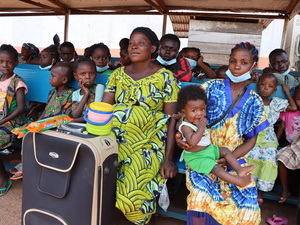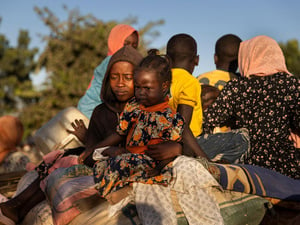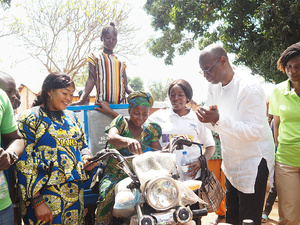Despite Boko Haram threat, some displaced Nigerians return
Despite Boko Haram threat, some displaced Nigerians return

UNHCR staff speak with community members after inspecting the damage in Garaha, Adamawa state, Nigeria.
DUGWABA, Nigeria, June 6 (UNHCR) – When Boko Haram militants stormed into this district in north-east Nigeria, torching houses and killing residents, smallholder John Lukius gathered up his belongings and ran for his life.
A year on, his crops are dead, his house is partially destroyed and the threat from the militants persists. But like thousands of other displaced people from this area close to the border with Cameroon, he felt he had little alternative but to head back to his ravaged home.
“There was nothing we could do but to return after more than one year out of home” and living in dire conditions at the border, he said. “We prefer to die here.”
Despite the Nigerian armed forces’ success in rolling back Boko Haram gains in north-east Nigeria, the insurgency group has turned to terror attacks in the region, and spread the conflict into neighbouring Cameroon, Chad and Niger, triggering fresh waves of displacement.
The growing insurgency has displaced some 1.8 million people within Nigeria while some 155,000 Nigerian refugees have fled to Cameroon, Chad and Niger, with many finding shelter with host communities. Hundreds of thousands more are displaced within the three neighbouring countries.
1.8 million people are displaced in Nigeria, while 155,000 have fled to Cameroon, Chad and Niger.
Dugwaba is in Adamawa state. Eight of the 14 villages that make up the district in this corner of north-east Nigeria were devastated by the marauding militants, who killed around 100 people, burned scores of homes, as well as a market and health centre.
Amid the chaos, some 15,000 people sought safety in cities including Yola and Numan in Adamawa State, while some fled to Kano in north central Nigeria. Many relied on the hospitality of host communities, most of them subsistence farmers who were barely able to meet their own needs, let alone those of thousands of others in dire need.
“Initially, relatives and friends welcomed and sympathized with many of us, but as time went on, we became a burden to them, and hostility started smouldering,” Lukius said, explaining the tensions that arose.
Despite the fact that many of the communities in Dugwaba have been sacked and torched, lack even basic health services and remain insecure, Lukius is now among 5,000 residents who have returned home.
UNHCR, the UN Refugee Agency, is extremely concerned that some residents are returning to Dugwaba without adequate protection. “The humanitarian and protection needs in the north-east as a whole are staggering,” said Angele Dikongue-Atangana, UNHCR’s representative in Nigeria. “UNHCR is advising residents to postpone their return to conflict-affected areas where insecurity remains an issue and where they are unable to resume their lives in a safe and dignified way,” she added.
“The humanitarian and protection needs in the north-east as a whole are staggering.”
In a clear sign that those conditions do not prevail in many areas where Nigerian armed forces are stretched thin, around 100 civilian volunteers have organized themselves into vigilante patrols in an attempt to protect their communities from the militants.
“Two weeks ago the district vigilantes, who collaborate with the military, fought back a remnant of Boko Haram elements to protect their area,” a resident, who declined to be identified, revealed.
The vigilantes vow never again to run away from their villages because of the insurgents. “We have returned home to stay, no matter what happens,” vows one of the vigilantes, a university graduate who declined to give his name.
He revealed that they patrol the villages at night right up to the fringes with Sambisa forest, the stronghold of the insurgents, situated approximately 35 kilometres away from the district. They have lost about 10 members.

People walk past the rubble of houses destroyed by Boko Haram militants in Garaha, Adamawa state, Nigeria.
Far from being coerced to go back, most of the people of Dugwaba returned on their own accord and have so far received minimal assistance from faith-based organizations and NGOs. “The situation of our people is pathetic. We need roofing sheets, food and shelter, because some of us are old and sick at the same time,” pleads Lukius.
While the women are battling to survive by small-scale trading, most of the men are simply hanging around idle. Also, the only bridge linking the district to next door Hong district has collapsed and, during the rainy season, it is difficult to go out of the village. This has, in effect, compounded the problems of the almost isolated district.
During a visit to Nigeria in February 2016, UNHCR’s top protection official, Volker Türk, called on the Nigerian authorities to heed the concerns of internally displaced people (IDPs) in the north-east of the country. “We all need to listen to the IDPs, their aspirations and sense of dignity and safety,” he stressed.
The protection needs of those displaced by the conflict in the Lake Chad Basin will be discussed at a high-level regional meeting this week in Abuja, organized by UNHCR and the Nigerian Government.








